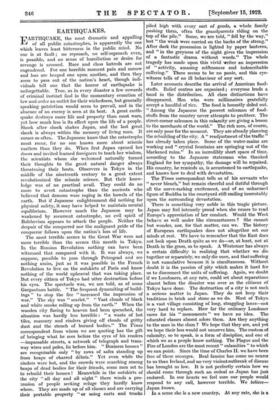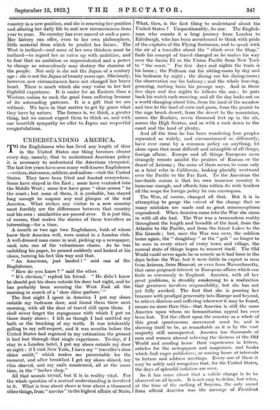EARTHQUAKES.
FARTHQUAICE, the most dramatic and appalling of all public catastrophes, is apparently the one which leaves least bitterness in the public mind. No one is at fault ; no reproach, no self-reproach even, is possible, and no sense of humiliation or desire for revenge is aroused. Race and class hatreds are not engendered. For one horrible moment pain and sorrow and loss are heaped one upon another, and then they seem to pass out of the nation's heart, though indi- viduals tell one that the horror of earthquake is unforgettable. True, as in every disaster a few cowards of criminal instinct find in the momentary cessation of law and order an outlet for their wickedness, but generally speaking patriotism would seem to prevail, and in the absence of an enemy is seen at its best. A great earth- quake destroys more life and property than most wars, yet how much less is its effect upon the life of a people. Shock after shock shakes Japan, and the last great shock is always within the memory of living man. It comes so often. The Japanese know that the catastrophe must recur, for no one knows more about seismic matters than they do. When first Japan opened her doors and invited learned foreigners to teach her wisdom, the scientists whom she welcomed naturally turned their thoughts to the great natural danger always threatening their hosts. Observers in Tokyo in the middle of the nineteenth century to a great extent revolutionized the seismic science. But their know- ledge was of no practical avail. They could do no more to avert catastrophe than the ancients who believed that demons were raging in the bowels of the earth. But if Japanese enlightenment did nothing for physical safety, it may have helped to maintain mental equilibrium. However much the Japanese may be weakened by recurrent catastrophe, no evil spirit of Bolshevism appears to attack the people. Neither the despair of the conquered nor the malignant pride of the conqueror follows upon the nation's loss of life.
The most terrible scenes in the Great War were not more terrible than the scenes this month in •Tokyo. In the Russian Revolution nothing can have been witnessed that compared with it. It was always, we suppose, possible to pass through Petrograd and see nothing amiss, just as it was possible in the French Revolution to live on the outskirts of Paris and know nothing of the world upheaval that was taking place. But every citizen of Tokyo had utter destruction before his eyes. The spectacle was, we are told, as of some Gargantuan battle. "The frequent dynamiting of build- ings" to stop the fire "increased the impression of war." The sky was "scarlet." "Vast clouds of black and white smoke rolling up from the earth." When the wooden city flaring to heaven had been quenched, the situation was hardly less horrible: "a waste of hot tiles, masonry and cinders giving off clouds of gritty dust and the stench of burned bodies." The Times correspondent from whom we are quoting has the gift of bringing what he sees before the eyes of his readers —impassable streets, a network of telegraph and tram- way wires and poles, lie before him. "Business houses" are recognizable only "by rows of safes standing up from heaps of charred debris." Yet even while the cinders were hot, and the crowds were searching among heaps of dead bodies for their friends, some men set to to rebuild their houses I Meanwhile in the outskirts of the city "all day and all night" there winds a pro- cession of people seeking refuge they hardly know where. They are made up of all classes and are carrying their portable property "or using carts and trucks piled high with every sort of goods, a whole family pushing them, often the grandparents riding on the top of the pile." Some, we ere told, "fell by the way," but "the weak were carried on the backs of the strong." After dark the procession is lighted by paper lanterns, and "in the greyness of the night gives the impression of a fantastic drama without words.' The whole tragedy has made upon this vivid writer an impression of "activity, amazing selflessness and indescribable suffering." There seems to be no panic, and this eye- witness tells of no ill behaviour of any sort.
Later accounts describe the arrival of American food- stuffs. Relief centres are organized ; everyone lends a hand in the distribution. All class distinctions have disappeared. Men who were millionaires gratefully accept a handful of rice. The food is honestly doled out. "Among the Japanese the poorest salesman of food- stuffs from the country never attempts to profiteer. The street-corner salesmen in this calamity are giving a lesson to the merchants of the world." The rich men, of course, are only poor for the moment. They are already planning the rebuilding of the city. A" readjustment of the traffic" has already taken place. Some of the water-mains are working and "crystal fountains are springing out of the blackened ruins." In an incredibly short space of time, according to the Japanese statesman who thanked England for her sympathy, the damage will be repaired. His country, he reminds us, is accustomed to earthquake, and knows how to deal with devastation.
The Times correspondent tells us of his servants who "never blench," but remain cheerful and dutiful through all the nerve-racking excitement, and of an unharmed figure of Buddha in the courtyard still smiling inscrutably upon the surrounding devastation.
There is something very noble in this tragic picture. Japan may feel intensely proud when she comes to read Europe's appreciation of her conduct. Would the West behave as well under like circumstances ? She cannot but wonder, nor, for that matter, can we. The history of European earthquakes does not altogether set our minds at rest. We have to remember that the East does not look upon Death quite as we do—or, at least, not at Death in the gross, so to speak. A Westerner has always a certain difficulty in realizing that whether we die together or separately, we only die once, and that suffering is not cumulative because it is simultaneous. Without doubt it is the passion of pity which makes it hard for us to disconnect the units of suffering. Again, we doubt if we Londoners, at any rate, could set about reparations almost before the disaster was over as the citizens of Tokyo have done. The destruction of a city is not such a serious matter in Japan. They do not keep their traditions in brick and stone as we do. Most of Tokyo is a vast village consisting of long, straggling lanes—not very hard to replace. How far the ordinary Londoner cares for his " monuments " we have no idea. The educated classes almost adore them. Are they anything to the man in the slum ? We hope that they are, and yet we hope their loss would not unnerve-him. The custom of calamity, so to speak, is a form of discipline, and one of which we as a people know nothing. The Plague and the Fire of London are the most recent" calamities "to which we can point. Since the time of Charles II. we have been free of these scourges. Real famine has come no nearer to us than Ireland, and no very violent outbreak of disease has brought us low. It is not perfectly certain how we should come through such an ordeal as Japan has just endured. In our hearts we feel sure our people would respond to any call, however terrible. We believe— Japan knows.
in a sense she is a new country. At any rate, she is a country in a new position, and she is renewing her position and altering her daily life to suit new circumstances from year to year. No country has ever moved at such a pace. Her history can offer, even to her own philosophers, little material from which to predict her future. The West is inclined—and some of her own thinkers must be inclined—to regard her as eaten up with ambition, and to fear that an ambition so unprecedented and a power to change so miraculously may destroy the stamina of the people. Not only is she not the Japan of a century ago : she is not the Japan of twenty years ago. Obviously, however, new circumstances have not changed her brave heart. There is much which she may value in her last frightful experience. It is easier for an Eastern than a Western nation to suck the good from suffering because of its astounding patience. It is a gift that we are without. We have in that matter to get by grace what they have by nature. The former is, we think, a greater thing, but we cannot expect them to think so, and with our heartfelt sympathy we offer to Japan our respectful congratulations.



































 Previous page
Previous page